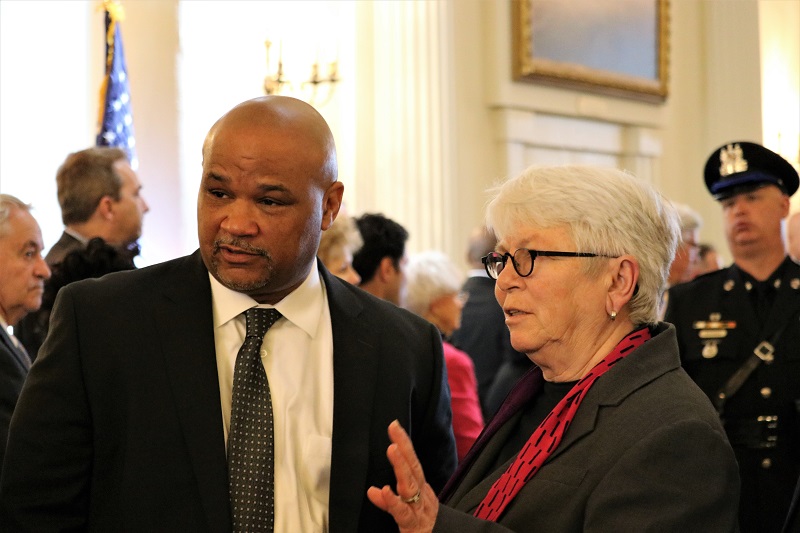Josh Kurtz: When Historical Imperatives and Voting Records Collide

If Del. Dereck E. Davis (D-Prince George’s) loses his bid to become speaker of the Maryland house on Wednesday, it won’t be because he’s black.
Some of Davis’ African-American colleagues may try to advance that narrative anyway.
If Davis does lose, the seeds of his defeat may have been sown when he voted against marriage equality in 2012. Or when his House Economic Matters Committee slow-walked and watered down minimum wage and paid family sick leave legislation. Or when he introduced a bill that would make state law take pre-eminence over local minimum wage bills, and cozied up to the many industry lobbyists who regularly populate his committee hearing room.
Davis is an extremely savvy and conscientious lawmaker – and one of the nicest guys in Annapolis. But there is no escaping the fact that Davis has at times been out of sync with the majority of the House Democratic Caucus, which has moved steadily to the left since he first entered the legislature in 1995.
It may well be that Davis is able to cobble together a majority of votes on the House floor Wednesday – especially if he’s aided significantly by 42 Republicans. But in a chamber with a Democratic supermajority, in the era of Trump, it’s hard to see that model of leadership being workable or sustainable.
Of course, Davis is not a conservative, as some of his critics complain. In fact, he pushes back, noting that he introduced the first renewable energy bill when Republican Robert L. Ehrlich Jr. was governor; introduced the first statewide minimum wage bill; got the offshore wind legislation moving during the O’Malley administration; and gave an impassioned and difference-making speech on the House floor when lawmakers were debating whether to eliminate capital punishment.
But some of those achievements seem like ancient history; being where the Democratic Caucus is now may be a prerequisite for a new presiding officer. Dereck Davis does not appear to be where this highly energized and very progressive Democratic Caucus is now.
The late Speaker Michael E. Busch (D) was respectful of House Republicans, and gave them as much leeway as he felt he could. But, as he liked to say at party gatherings, Busch woke up every morning, put on his blue jersey (he loved the sports metaphors), and went to work fighting for Democratic principles.
Davis points out that whether he or House Appropriations Chair Maggie L. McIntosh is the next speaker, a Democrat will control the chamber. But is that enough?
McIntosh has laid out a progressive vision for the future; Davis has not. With a Republican in the White House and a Republican as governor, that could matter.
There is plenty of legitimacy to African-American leaders’ grievance that their voters are taken for granted by party leaders and that their candidates have trouble breaking through the glass ceiling in Maryland. Your friendly neighborhood columnist has been writing about this lament for two decades now, for a variety of publications.
But let’s not forget that the last two Democratic nominees for governor have been black – and that one of them, Anthony G. Brown, was promoted heavily by party insiders. It’s true that white candidates prevailed over black contenders in the most recent primaries for open U.S. Senate seats in 2006 and 2016, largely with the help of the party establishment. But the feeling here is that if Kweisi Mfume had had a more robust fundraising operation in 2006, he and not Benjamin L. Cardin would be sitting in the Senate today.
It’s perfectly understandable why the senior leaders of the Legislative Black Caucus – and about two-thirds of the membership – have rallied around Davis. And why they’ll be deeply disappointed if he loses. But it’s also very telling that a third of the caucus – younger and more progressive members, by and large – appear to have sided with McIntosh.
There are going to be bruised feelings in the aftermath of Wednesday’s vote, with plenty of soul searching and healing to be done.
Mike Busch was the rare figure who could keep a diverse and changing and fractious Democratic caucus together. But that doesn’t mean the leaders who come next won’t be up to the task. They’ll just need plenty of help from their colleagues.
Leadership means adapting and growing into the job. Maggie McIntosh or Dereck Davis both have the tools to be very good House speakers. Whoever wins, it may be a little messy for a while.




 Creative Commons Attribution
Creative Commons Attribution